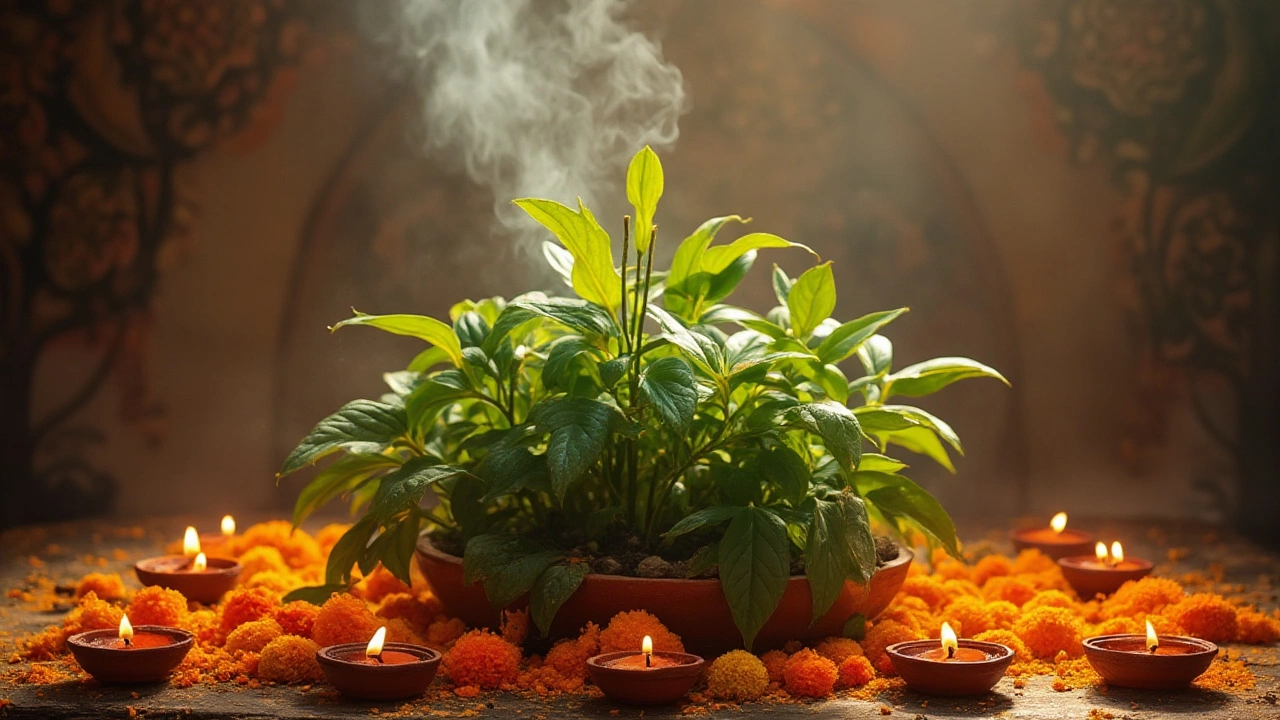Ayurveda, the ancient Indian science of life and well-being, has long emphasized the power of nature's botanicals in promoting health. Among these, Tulsi, also known as Holy Basil, garners an esteemed status. While many herbs claim to possess healing powers, Tulsi’s legacy and multifaceted benefits make it a cornerstone in Ayurvedic practices.
This remarkable herb is revered not only for its mythological significance but also for its potential to bolster health. Its ability to address a myriad of ailments, from common colds to stress, highlights its versatility. As we journey through this article, explore why Tulsi is crowned the king of herbs and how it can be a vital component of a wholesome lifestyle.
- The Historical Relevance of Tulsi
- Healing Properties and Health Benefits
- Tulsi in Daily Life
- Scientific Insights and Modern Uses
The Historical Relevance of Tulsi
The ancient herb known as Tulsi, or Holy Basil, has a narrative deeply interwoven with the cultural and spiritual fabric of India. Dating back thousands of years, this verdant green plant holds a special place not only in Ayurveda but also in the daily lives of millions who adhere to its medicinal and spiritual significance. Tulsi is often worshipped in Hindu households, where it grows in earthen pots and is revered as a manifestation of the goddess Lakshmi. Its presence is believed to purify the environment and bring positivity to the home. The Rigveda, one of the oldest sacred texts, makes references to herbs such as Tulsi, highlighting their elemental role in Vedic rituals and practices.
In Ayurvedic lore, Tulsi is celebrated as 'The Incomparable One,' underscoring its unrivaled status among herbs. This reputation emerges from its diverse applications—from being an adaptogen that helps balance stress to acting as an antibacterial agent. In tales passed down through generations, Tulsi was known to be indispensable in the ancient healing practices. Moreover, during the time of Charaka, a key figure in Ayurvedic medicine, Tulsi was frequently utilized in preparing remedies for respiratory ailments and skin conditions, with directions for its use meticulously documented in classical texts. This historical tradition has continued to influence modern Ayurvedic medicine today.
The great Ayurvedic scholar Charaka is known to have said, "Tulsi is unparalleled in its virtues, and the home without it bears silent witness to the ailments of life."Tulsi's historical role also extends beyond the subcontinent. It was introduced to various parts of the world through ancient trade routes and was integrated into local medicinal systems. Its leaves were often used in traditional Chinese medicine as a means of balancing the mind and body, a testimony to its universal appeal. The timelines of history thus stand adorned with Tulsi's profound influence, making it a truly cherished herb across different cultures.
For centuries, Tulsi has lent itself to myriad uses, forming an essential part of both spiritual ceremonies and healing practices. Sudhir Bhargava, a contemporary Ayurvedic practitioner, recalls how his grandparents insisted on starting the day with Tulsi-infused water, emphasizing its role in detoxifying the system. Even today, Tulsi continues to be a testament to its historical legacy, with its presence subtly felt in everything from simple teas to complex therapeutic concoctions. As an herbal ambassador of Ayurveda, Tulsi speaks the language of history and health, earning its reputation as a sacred 'king of herbs' amidst the rich tapestry of Ayurvedic tradition.

Healing Properties and Health Benefits
Tulsi, often lauded as the king of Ayurvedic herbs, boasts an impressive array of healing properties that enhance both physical and mental well-being. Originating from the mint family, this herb holds a special place in traditional Indian households, not merely for its spiritual significance but also for its extensive medicinal benefits. Tulsi leaves, enriched with essential oils like eugenol, play a pivotal role in combating respiratory concerns, which are a common ailment in crowded urban environments. Its anti-bacterial properties are a boon for those who seek natural remedies against infections, making it a staple in homegrown medicinal practices.
Renowned as an adaptogen, Holy Basil aids in alleviating stress—an ever-present challenge in modern-day living. Adaptogens help the body normalize psychological functions, mitigating the impacts of stress. This unique quality places Tulsi above many herbal counterparts, providing a natural antidote to anxiety and mood swings. Imagine sipping on a warm cup of Tulsi tea, letting the serenity embrace you while its antioxidants battle oxidative stress, fortifying the body's resilience from within. The antioxidants found in Tulsi, such as vitamin C and A, zinc, and iron, not only bolster the immune system but also foster skin health by warding off free radicals.
Beyond its influence on mental harmony, this versatile Ayurvedic herb is also pivotal in chronic diseases management such as diabetes, thanks to its potential in regulating blood sugar levels. Several studies in contemporary medicine suggest that regular intake of Tulsi can result in a significant reduction in fasting blood glucose and LDL cholesterol, reiterating the health benefits revered for centuries. A 2021 study published in the 'Journal of Ethnopharmacology' emphasized the lowering effects of Tulsi on cortisol levels, bolstering its role in stress management and possibly enhancing longevity.
According to Dr. Ashutosh Gautam, an Ayurvedic practitioner, 'Tulsi is not merely a plant, but a symbol of holistic healing, promising a better life through finer balance.'These myriad health benefits make it a cherished component in both preventative and therapeutic measures.
In addressing seasonal allergies, cold, and flu symptoms, the expectorant and anti-inflammatory qualities of Tulsi make it an excellent choice. Consuming Tulsi helps open respiratory pathways, providing relief from persistent coughs. For parents, introducing Tulsi to children's diets can be a natural way to support their wellbeing during cold-prone periods. The therapeutic effects are not confined to treating physical illnesses; Tulsi's potential extends to improving cognitive function. Recent research suggests a positive link between regular Tulsi consumption and improved memory and cognitive function, an aspect which is becoming increasingly vital as individuals seek to maintain sharpness in their later years. Such versatility consolidates Tulsi's rightful acclaim as a pivotal agent in Ayurvedic medicine.
The diverse uses of Tulsi in day-to-day life are encapsulated in its adaptability across various forms—be it fresh leaves, dried powders, teas, or essential oils. Its adaptability makes it easy for anyone to integrate its healing potential into their personal health routine. By acknowledging these Tulsi benefits, individuals can nurture themselves with one of nature’s most potent gifts, fostering a lifestyle that prioritizes enduring health and harmony.

Tulsi in Daily Life
Incorporating Tulsi into your everyday routine can be both a simple and transformative experience. This revered herb, deeply woven into the cultural and spiritual fabric of India, extends its benefits to various aspects of daily life. Regularly consuming Tulsi tea can invigorate your morning routine, offering a caffeine-free alternative that gently awakens the senses while bolstering the body's defense mechanisms. This practice is not just about savoring a warm, aromatic brew; it’s about beginning the day with ancient wisdom that nurtures well-being and harmony.
Many families in India grow Tulsi in their courtyards or by windowsills, as it requires minimal care and offers maximum utility. This practice serves more than an ornamental purpose; having a Tulsi plant at home encourages a connection with nature and continuous access to fresh leaves. Chewing a few fresh Tulsi leaves every morning can aid in respiratory health, clear toxins, and uplift the mood, making it a staple in natural self-care routines.
The versatility of Tulsi extends to culinary uses, where its bright and somewhat peppery flavor can enhance various dishes. Incorporate it fresh in salads or steep the leaves in soups for a distinctive touch. For those interested in exploring its aromatic qualities, Tulsi-infused oils are a splendid way to experience its benefits. Whether using these oils for massage or as a part of aromatherapy, they can offer a soothing sanctuary amidst the chaos of contemporary life. For those wondering about the adaptability of Tulsi, there has been a marked increase in the use of Tulsi in modern herbal supplements and wellness products, a testament to its ever-growing popularity beyond traditional uses.
According to a study published in the Journal of Ayurveda and Integrative Medicine, 'Tulsi's use not only promises improvements in health and wellness, but it offers a grounding element, reminding us of the intricate balance between humans and nature.'
Childhood memories for many include mothers preparing a soothing Tulsi concoction when they had a cough or cold. This simple remedy involves boiling a few leaves in water with honey and ginger, a recipe passed down through generations. Such traditions emphasize how Tulsi holds a place not just in medicine but in the nurturing warmth of home. It demonstrates not only the herb's medicinal properties but its role in familial love and care, a gentle reminder of the nurturing aspect inherent in human relationships.
The holistic benefits of Tulsi transcend the boundaries of health, weaving into spiritual practices as well. The scent of Tulsi can be found wafting through homes, particularly in the mornings, as people use its leaves in their prayers and rituals. The herb has been associated with purification and sanctity, making it an integral part of spiritual cleanliness in Hindu traditions. Its application in rituals stems not only from folklore but also from a body of knowledge recognizing Tulsi as a bridge between health, spirituality, and the environment.

Scientific Insights and Modern Uses
The fascinating realm of science has unraveled many of the mysteries that surround the revered herb, Tulsi. In recent years, this has led to a surge in research focused on its various health benefits. Embracing its Ayurvedic roots, modern science has begun to validate what ancient sages have long advocated. Tulsi is packed with essential oils, antioxidants, and bioactive compounds such as eugenol, which is noted for its anti-inflammatory and antimicrobial effects. These properties make Tulsi a potent ally against infections, inflammation, and promoting overall wellness. Numerous studies attest to its ability to regulate blood sugar levels, which is vital in managing conditions like diabetes.
Moreover, in a world that often demands peak performance and mental acuity, Tulsi emerges as a boon. Its adaptogenic qualities are praised for reducing stress and anxiety, making it a natural choice for those seeking balance amidst life's chaos. In fact, several academic journals have published findings that show regular consumption of Tulsi can indeed enhance cognitive functions and promote a calm state of mind. Dr. Sachin Dev, a well-respected herbal researcher, once noted,
"Tulsi's unique compound composition creates a biological harmony that makes it invaluable for mental health and concentration."Such endorsements add weight to the anecdotal evidence surrounding Tulsi benefits.
The modern world has seen a shift towards natural and holistic remedies, partly due to increasing awareness of the side effects of synthetic drugs. Embracing this trend, the pharmaceutical and nutraceutical industries are actively incorporating Tulsi into a plethora of products. From supplements and teas to essential oils and skincare, Tulsi's versatility knows no bounds. As more research rolls in, its significance in Western medicine grows, bridging the gap between traditional and modern healthcare practices. It's common to find Tulsi being used in wellness retreats and urban households alike, a testament to its growing popularity outside India.
For those looking to include Tulsi in their daily regimen, the options are delightful and varied. One can start their day with a refreshing cup of Tulsi tea, which not only invigorates but also aids digestion. Alternatively, incorporating Tulsi leaves in dishes can add nutritional value, while Tulsi extracts in modern supplements ensure a concentrated dose of its benefits. Given Tulsi's ability to detoxify, it is increasingly used in detox drinks and practices that promise to cleanse the body and mind. This, combined with its immune-boosting attributes, aligns it perfectly with contemporary lifestyles that often necessitate resilience and vitality.
The enduring impact of Holy Basil in both traditional and modern medicinal practices reveals a determined march towards integrating its potential into everyday life, much like a silent guardian ensuring our well-being. As we continue to explore its depths with scientific rigor, Tulsi undoubtedly stands as a beacon of wellness, offering a harmonious blend of physical, mental, and spiritual health. Those embracing its myriad uses find themselves tapping into a legacy that embodies the wisdom of ancient Ayurveda meshed with contemporary innovation.



